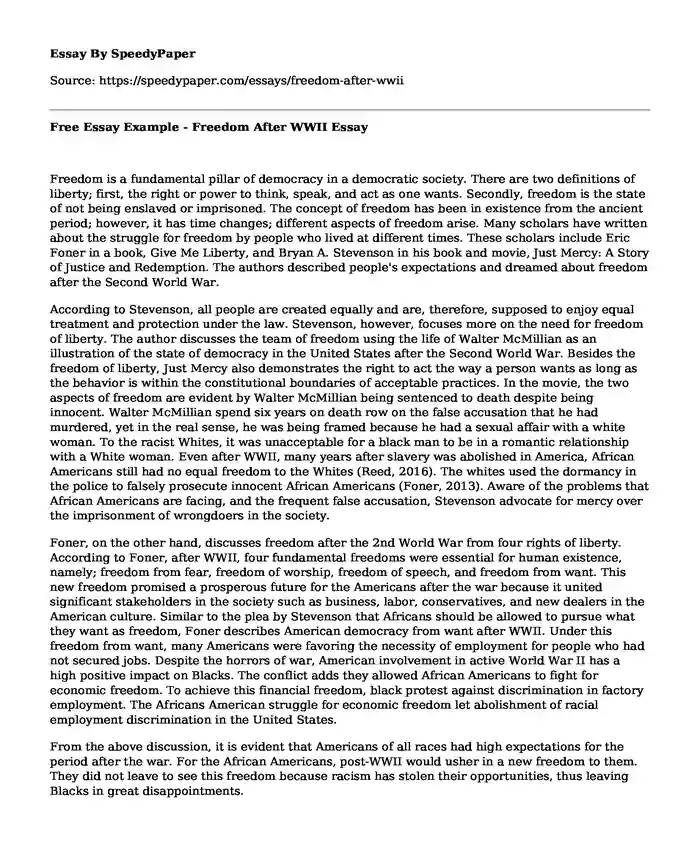
| Type of paper: | Essay |
| Categories: | Race World War 2 United States |
| Pages: | 3 |
| Wordcount: | 693 words |
Freedom is a fundamental pillar of democracy in a democratic society. There are two definitions of liberty; first, the right or power to think, speak, and act as one wants. Secondly, freedom is the state of not being enslaved or imprisoned. The concept of freedom has been in existence from the ancient period; however, it has time changes; different aspects of freedom arise. Many scholars have written about the struggle for freedom by people who lived at different times. These scholars include Eric Foner in a book, Give Me Liberty, and Bryan A. Stevenson in his book and movie, Just Mercy: A Story of Justice and Redemption. The authors described people's expectations and dreamed about freedom after the Second World War.
According to Stevenson, all people are created equally and are, therefore, supposed to enjoy equal treatment and protection under the law. Stevenson, however, focuses more on the need for freedom of liberty. The author discusses the team of freedom using the life of Walter McMillian as an illustration of the state of democracy in the United States after the Second World War. Besides the freedom of liberty, Just Mercy also demonstrates the right to act the way a person wants as long as the behavior is within the constitutional boundaries of acceptable practices. In the movie, the two aspects of freedom are evident by Walter McMillian being sentenced to death despite being innocent. Walter McMillian spend six years on death row on the false accusation that he had murdered, yet in the real sense, he was being framed because he had a sexual affair with a white woman. To the racist Whites, it was unacceptable for a black man to be in a romantic relationship with a White woman. Even after WWII, many years after slavery was abolished in America, African Americans still had no equal freedom to the Whites (Reed, 2016). The whites used the dormancy in the police to falsely prosecute innocent African Americans (Foner, 2013). Aware of the problems that African Americans are facing, and the frequent false accusation, Stevenson advocate for mercy over the imprisonment of wrongdoers in the society.
Foner, on the other hand, discusses freedom after the 2nd World War from four rights of liberty. According to Foner, after WWII, four fundamental freedoms were essential for human existence, namely; freedom from fear, freedom of worship, freedom of speech, and freedom from want. This new freedom promised a prosperous future for the Americans after the war because it united significant stakeholders in the society such as business, labor, conservatives, and new dealers in the American culture. Similar to the plea by Stevenson that Africans should be allowed to pursue what they want as freedom, Foner describes American democracy from want after WWII. Under this freedom from want, many Americans were favoring the necessity of employment for people who had not secured jobs. Despite the horrors of war, American involvement in active World War II has a high positive impact on Blacks. The conflict adds they allowed African Americans to fight for economic freedom. To achieve this financial freedom, black protest against discrimination in factory employment. The Africans American struggle for economic freedom let abolishment of racial employment discrimination in the United States.
From the above discussion, it is evident that Americans of all races had high expectations for the period after the war. For the African Americans, post-WWII would usher in a new freedom to them. They did not leave to see this freedom because racism has stolen their opportunities, thus leaving Blacks in great disappointments.
References
Foner, E. (2013). Give Me Liberty! An American History: Seagull Fourth Edition (Vol. 1). WW Norton & Company. Retrieved from https://books.google.co.ke/books?hl=en&lr=&id=uUbeCgAAQBAJ&oi=fnd&pg=PR15&dq=give+me+liberty&ots=rXZN2Fxcgk&sig=EV6mjFiJ3_a1--irU7ze2biO4fg&redir_esc=y#v=onepage&q=give%20me%20liberty&f=false
Reed, G. (2016). Just Mercy: A Story of Justice and Redemption. Voices: The Art and Scienceof Psychotherapy, 52(3), 103-104. Retrieved from https://www.uucr.org/sites/default/files/UUCR%20Adult%20Faith%20Formation%20Common%20Read.pdf
Cite this page
Free Essay Example - Freedom After WWII. (2023, Mar 06). Retrieved from https://speedypaper.net/essays/freedom-after-wwii
Request Removal
If you are the original author of this essay and no longer wish to have it published on the SpeedyPaper website, please click below to request its removal:
- Educational Inequality, Essay Sample
- Check the Settings for Public Health in Our Free Essay
- Free Essay: Severe Disability and Its Influence on Family
- Cancer Screening Essay Sample
- Free Essay Example on Forex Trading
- Essay Sample on Theology and Civil Rights
- Essay Sample on Music and Social Justice Movements
Popular categories




